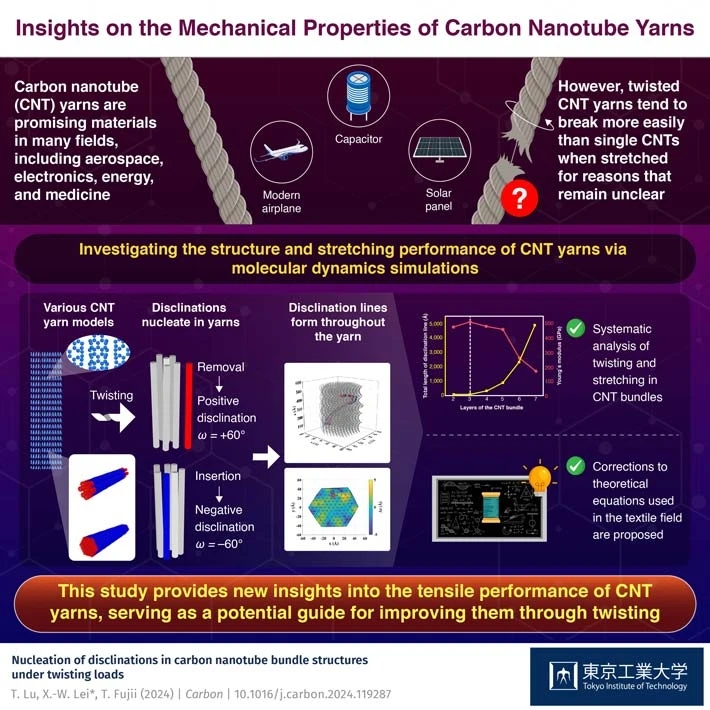Researchers at the Tokyo Institute of Technology have identified that the poor mechanical performance of carbon nanotube (CNT) bundles and yarns is likely due to localized rearrangements of the CNTs during twisting. Through molecular dynamics simulations, they discovered that twisting CNT bundles creates disclination lines, which negatively impact the overall tensile properties. Their findings are published in the journal Carbon.

Insights on the Mechanical Properties of Carbon Nanotube Yarns. Image Credit: Tokyo Institute of Technology
In addition to being a fundamental element for life, carbon is highly researched for its versatility in engineering applications. Carbon nanotubes (CNTs), in particular, show immense potential for use in aerospace, semiconductor, and medical fields due to their exceptional strength and light weight.
However, since CNTs are generally short, they need to be woven into bundles or yarns to enhance their practical applications. Despite this, scientists have observed that when CNT bundles (CNTBs) and yarns are twisted, their tensile strength significantly decreases—sometimes by several orders of magnitude compared to single CNTs. The underlying reasons for this phenomenon have remained elusive despite extensive research.
A recent study published in the journal Carbon, led by Associate Professor Xiao-Wen Lei from the Tokyo Institute of Technology, aimed to address this issue. The researchers utilized molecular dynamics (MD) simulations combined with the Delaunay triangulation algorithm to explore the internal dynamics of twisted CNTBs.
The team created various CNTB models and configurations for the simulations, considering different CNT layer numbers, lengths, twisting angles, and force profiles. They then analyzed the reactions of the CNTBs to stretching both before and after twisting.
Their observations revealed that the reduced mechanical performance of twisted CNTBs and yarns could be attributed to 'wedge disclinations.' CNTs typically form hexagonal patterns when bundled, and a disclination occurs when this pattern is disrupted, either by the absence of a CNT (positive disclination) or the addition of an extra CNT (negative disclination).
The simulations showed that twisting caused local rearrangements of the CNTs, leading to the formation of disclinations. In CNTBs with more layers, these disclinations formed long, curved lines that significantly impacted the tensile properties when the CNTBs were mechanically stretched.
We observed that the presence of disclination lines resulted in a decrease in the Young's modulus of the CNTBs, with longer disclination lines corresponding to a lower Young's modulus. The appearance of disclination lines in twisted CNTBs may thus be one of the key reasons for the decline in the mechanical properties of the CNT yarns.
Xiao-Wen Lei, Associate Professor, Tokyo Institute of Technology
When combined, the study's results provide insight into the reasons behind some of the present constraints facing CNTBs and offer a few possible avenues for developing high-performance CNT yarns through twisting.
Leveraging insights gained from understanding the correlation between microscopic internal stacking structural changes and mechanical properties caused by the introduction of lattice defects in materials could pioneer a new academic field related to computational materials science. We ultimately aim for our research to contribute to the realization of a smart, sustainable, and prosperous society in the near future.
Xiao-Wen Lei, Associate Professor, Tokyo Institute of Technology
Journal Reference:
Lu, T., et al. (2024) Nucleation of disclinations in carbon nanotube bundle structures under twisting loads. Carbon. doi.org/10.1016/j.carbon.2024.119287